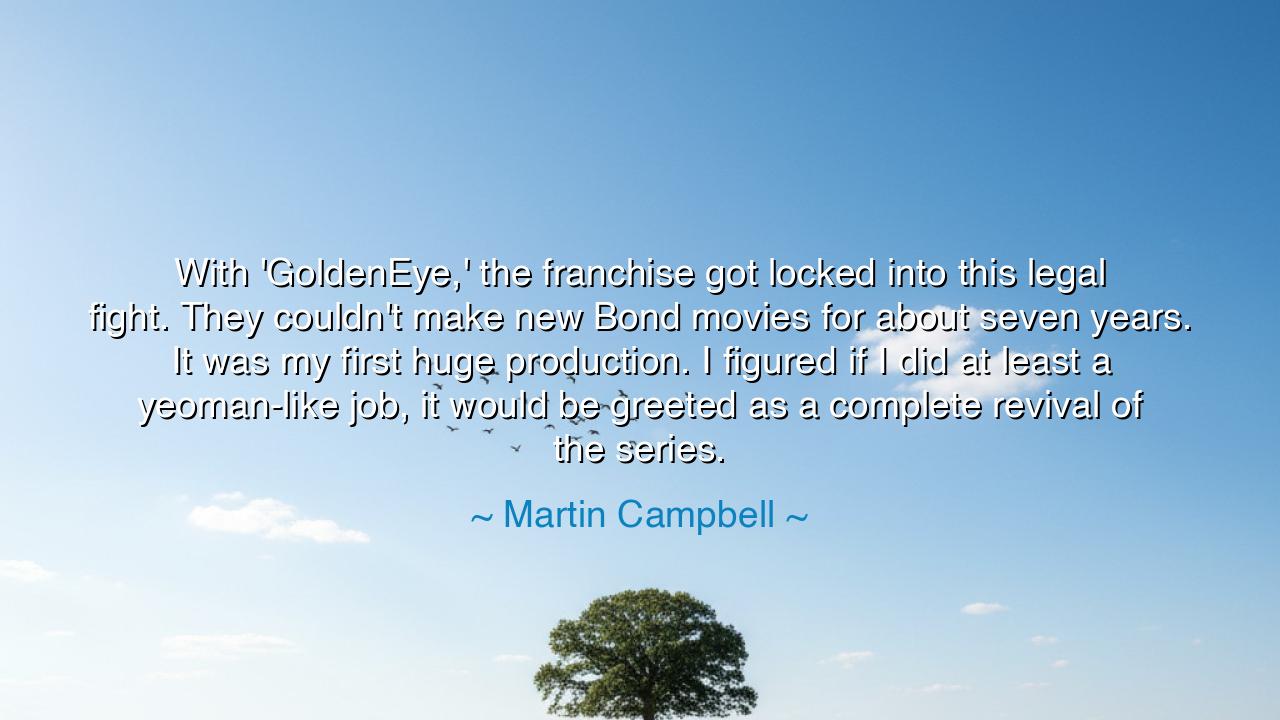
With 'GoldenEye,' the franchise got locked into this legal fight.
With 'GoldenEye,' the franchise got locked into this legal fight. They couldn't make new Bond movies for about seven years. It was my first huge production. I figured if I did at least a yeoman-like job, it would be greeted as a complete revival of the series.






Hearken, O students of craft and perseverance, to the words of Martin Campbell, who declared: “With ‘GoldenEye,’ the franchise got locked into this legal fight. They couldn’t make new Bond movies for about seven years. It was my first huge production. I figured if I did at least a yeoman-like job, it would be greeted as a complete revival of the series.” In these words, the seasoned director reflects not merely on cinema, but on the weight of legacy, the patience of creation, and the courage to restore what once seemed lost. For this is no mere tale of film—it is the eternal story of how men and women must rebuild what time, conflict, and delay have nearly destroyed.
The Bond franchise, like an empire of the modern age, had fallen into dormancy, chained by legal disputes and creative uncertainty. For seven long years—an eternity in the restless world of entertainment—the character who once symbolized sophistication, adventure, and courage lay silent. The machinery of production stood still, while fans waited as though for the return of a mythic hero. When Martin Campbell stepped forth to direct GoldenEye in 1995, he faced not only the challenge of making a film, but of reviving an institution, of breathing life into a legend tarnished by time and litigation.
To say he hoped to do a “yeoman-like job” is the language of humility—but beneath it lies a truth that all wise creators know: that greatness is often born from steady, disciplined labor rather than reckless ambition. Campbell did not seek to dazzle for vanity’s sake; he sought to restore integrity to a name that had become a relic. Like a craftsman rebuilding a fallen temple stone by stone, he understood that success would come not from extravagance, but from earnest dedication to the essence of what made the series endure—courage, style, wit, and the dance between chaos and control.
In this, one may recall the tale of Michelangelo, who was called to restore the glory of St. Peter’s Basilica after years of mismanagement and halted progress. The scaffolds stood empty, the plans mired in bureaucracy—just as the Bond franchise was bound by legal paralysis. Yet Michelangelo, like Campbell centuries later, approached his task not with arrogance, but with reverence. He saw himself not as the master of the work, but its servant—bound to rekindle its original spirit. And in doing so, he transformed what was delayed into what was timeless.
Campbell’s triumph with GoldenEye lies not only in the film’s success, but in its symbolism: it proved that delay does not mean death, and that even a legacy buried under legal and creative rubble can rise again through human conviction. The “legal fight” that halted progress becomes, in his reflection, a metaphor for all obstacles that stall creation. Every artist, every builder, every dreamer will face such stillness—moments when the world’s machinery seems turned against them. Yet Campbell reminds us that when the gates at last open, the task is simple: to serve the work with all one’s might, neither overreaching nor retreating.
The meaning of his quote, then, is one of perseverance and faith in craftsmanship. He speaks to all who inherit broken things—traditions, institutions, dreams—and must decide whether to walk away or rebuild. His humility is the mark of wisdom: he did not set out to surpass the legends before him, but to honor them, to restore their foundation so that future generations might stand upon it. And in doing so, he proved that faithful stewardship is as heroic as innovation.
O seekers of meaning, take this lesson to heart: when you inherit something precious that has fallen into silence—be it a dream, a craft, or a cause—do not despair at its delay. Time and law may restrain the body of a work, but they cannot imprison its spirit. Approach it as Campbell did—with patience, humility, and a will to restore rather than to replace. For when you do the work faithfully, the world will call it not a mere continuation, but a revival. And through your steady hand, what once seemed lost will live again, renewed by the quiet power of purpose.






AAdministratorAdministrator
Welcome, honored guests. Please leave a comment, we will respond soon